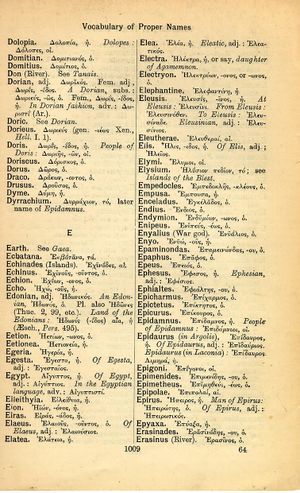Ephesus
Δίκαιος ἐὰν ᾖς, πανταχοῦ τῷ τρόπῳ χρήσῃ νόμῳ († λαληθήσῃ) → Si iustus es pro lege tibi mores erunt → Bist du gerecht, ist dein Charakter dir Gesetz (wirst du in aller Munde sein)
English > Greek (Woodhouse)
Ἔφεσος, ἡ.
Ephesian, adj.: Ἐφέσιος.
Latin > English (Lewis & Short)
Ĕphĕsus: i, f., = Ἔφεσος,
I an old and celebrated commercial city of Ionia, with a temple to Diana, now ruins near the village of Ayasaluk, Mel. 1, 17, 2; Plin. 5, 29, 31, § 131 sqq.; Plaut. Bacch. 2, 1, 2; 2, 3, 75; 102; 4, 9, 124 et saep.—Derivv.,
II Ĕphĕsĭus, a, um, adj., Ephesian: Diana, Plaut. Bacch. 2, 3, 73; id. Mil. 2, 5, 1; Cic. Div. 1, 23 fin.: mater, born at Ephesus, id. Phil. 3, 6, 15: pecunia, deposited in the temple there, Caes. B. C. 3, 33 fin.; 3, 105, 1. —Subst.: Ephesii, ōrum, m., the Ephesians, Plaut. Bacch. 2, 3, 75; Cic. Tusc. 5, 36, 105; Plin. 34, 8, 19, § 58 al.
Latin > French (Gaffiot 2016)
Ĕphĕsus,¹¹ ī, f. (Ἔφεσος), Éphèse [ville d’Ionie, célèbre par son temple de Diane] : Pl. Bacch. 171 ; Plin. 5, 131 || -sĭus, a, um, d’Éphèse : Cic. Div. 1, 47 || -sĭī, ōrum, m., Éphésiens, habitants d’Éphèse : Cic. Tusc. 5, 105.

